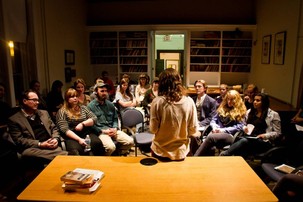
As a guitarist strummed light melodies, an older man and a younger woman took seats before the room. At round tables, groups of three and four people chatted while sipping coffee or tea. Conversation subsided as a man rose to introduce the woman and the man. They smiled, then with an attentive audience, the man began to read.
His voice cracked repeatedly. There was pride as he shared his new volume of poems. There also was nervousness as he spoke. His writing was appealing; what it revealed was arresting. Sometimes indirectly, sometimes bluntly, he told bits of his life. Now in his ninth decade, there were assorted missteps along with joys and achievements. He told his story. When he stopped, all rose and applauded.
So also the young woman. Far fewer decades produced no less honesty and power. Again there was applause and some tears. She also dared to tell her story, neither emphasizing nor avoiding painful times. But the telling, and the embracing response, offered a hopeful way forward for all who were there.
The reading occurred in a church basement that briefly became a coffee shop. Both the man and the woman had won acclaim for their poetry and listeners came from afar. But the two poets, so different and yet so alike, were church members. Their readings on their spiritual turf were not accidental. They spoke of struggles toward faith, personal journeys that continued. For each the church offered insight and direction, encouragement and hope. Neither was surprised this was the case.
The church must be where we can tell our stories and find acceptance. Not judgment, but direction; no rebuke but guidance. Affirmed when our true self shines through. Perhaps the church also must learn to tell its story in a way that we can journey together.
William L. Sachs
His voice cracked repeatedly. There was pride as he shared his new volume of poems. There also was nervousness as he spoke. His writing was appealing; what it revealed was arresting. Sometimes indirectly, sometimes bluntly, he told bits of his life. Now in his ninth decade, there were assorted missteps along with joys and achievements. He told his story. When he stopped, all rose and applauded.
So also the young woman. Far fewer decades produced no less honesty and power. Again there was applause and some tears. She also dared to tell her story, neither emphasizing nor avoiding painful times. But the telling, and the embracing response, offered a hopeful way forward for all who were there.
The reading occurred in a church basement that briefly became a coffee shop. Both the man and the woman had won acclaim for their poetry and listeners came from afar. But the two poets, so different and yet so alike, were church members. Their readings on their spiritual turf were not accidental. They spoke of struggles toward faith, personal journeys that continued. For each the church offered insight and direction, encouragement and hope. Neither was surprised this was the case.
The church must be where we can tell our stories and find acceptance. Not judgment, but direction; no rebuke but guidance. Affirmed when our true self shines through. Perhaps the church also must learn to tell its story in a way that we can journey together.
William L. Sachs
 RSS Feed
RSS Feed
